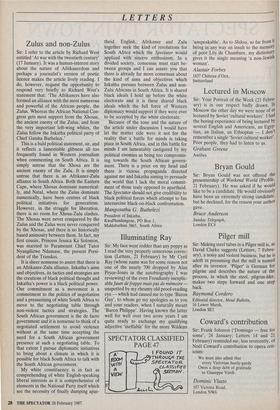LETTERS Zulus and non-Zulus
Sir: I refer to the article by Richard West entitled `At war with the twentieth century' (17 January). It was a human-interest story about the nature of Afrikanerdom and perhaps a journalist's version of poetic licence makes the article lively reading. I do, however, request the opportunity to respond very briefly to Richard West's statement that: 'The Afrikaners have also formed an alliance with the most numerous and powerful of the African people, the Zulus. Whereas the African National Con- gress gets most support from the Xhosas, the ancient enemy of the Zulus, and from the very important left-wing whites, the Zulus follow the Inkatha political party of Chief Gatsha Buthelezi.'
This is a bald political statement, sir, and it reflects a lamentable glibness all too frequently found in Western journalism when commenting on South Africa. It is simply untrue that the Xhosa are the ancient enemy of the Zulu. It is simply untrue that there is an Afrikaner-Zulu alliance in South Africa. Both the Eastern Cape, where Xhosas dominate numerical- ly, and Natal, where the Zulus dominate numerically, have been centres of black political initiatives for generations. However, in the struggle for liberation, there is no room for Xhosa-Zulu clashes. The Xhosas were never conquered by the Zulus and the Zulus were never conquered by the Xhosas, and there is no historically based animosity between them. In fact, my first cousin, Princess Jessica Ka Solomon, was married to Paramount Chief Tutor Nyangilizwe Ndamase, the present Presi- dent of the Transkei.
It is sheer nonsense to assert that there is an Afrikaner-Zulu alliance. Inkatha's aims and objectives, its tactics and strategies are the creations of black political thought and Inkatha's power is a black political power. Our commitment as a movement is a commitment to the politics of negotiation and a pressurising of white South Africa to move to the negotiating table through non-violent tactics and strategies. The South African government is the de facto government and it is nonsense to think of a negotiated settlement to avoid violence without at the same time accepting the need for a South African government presence at such a negotiating table. To that extent I pursue diplomatic initiatives to bring about a climate in which it is possible for black South Africa to talk with the South African government.
My white constituency is in fact as comprehending of white English-speaking liberal interests as it is comprehensive of elements in the National Party itself which see the necessity of finally dumping apar- theid. English, Afrikaner and Zulu together seek the kind of resolutions for South Africa which the Spectator would applaud with sincere enthusiasm. In a divided society, consensus must start be- tween groups and I can assure you that there is already far more consensus about the kind of aims and objectives which Inkatha pursues between Zulus and non- Zulu Africans in South Africa. It is shared black ideals I hold up before the white electorate and it is these shared black ideals which the full force of Western diplomacy would support if they were ever to be accepted by the white electorate.
Because of the tone and the nature of the article under discussion I would have let the matter ride were it not for the reality that a battle for minds is taking place in South Africa, and in this battle for minds I am lamentably castigated by my political enemies as being too compromis- ing towards the South African govern- ment. There is a price on my head and there is vicious propaganda directed against me and Inkatha aiming to persuade the world that I lack the moral commit- ment of those truly opposed to apartheid. The Spectator should not give credibility to black political forces which attempt to fan internecine black-on-black confrontation. Mangosuthu G. Buthelezi
President of Inkatha, KwaPhindangene, PO Box 1, Mahlabathini 3865, South Africa


















































 Previous page
Previous page